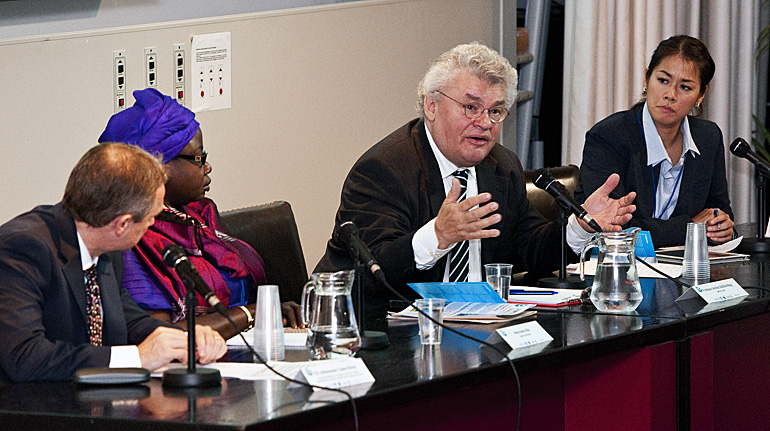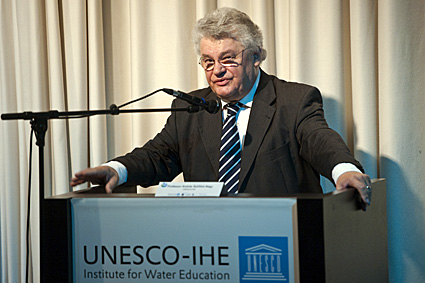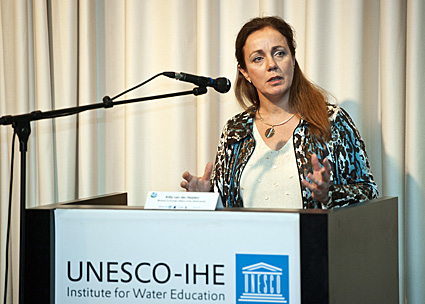5th Delft symposium: lagging capacity may restrain new post-2015 water goals

"It is of paramount importance to train a next generation of water leaders, capable of interacting with other sectors, to involve local stakeholders and deal with transboundary water resources", said rector Andreas Szöllösi-Nagy (talking in photo above) of the Unesco-IHE education institute at the opening session of the 5th Delft Symposium on Water Sector Capacity Development on 29 May.
"Sustainable use of water resources is the key issue for 6,5 billion people living in water stressed river basins where water demands exceeds the natural refill of the water bodies", the Unesco-IHE rector said. "These kind of water problems cannot be solved if there is no individual or institutional capacity to develop long term water resource strategies with monitoring, decision making and taking measures."
Unesco-IHE hosts the symposium that takes place in Delft from 29 - 31 May.
Re-invention of capacity development
Rector Szöllösi-Nagy warned that if the United Nations sets new ambitious post-2015 water goals, the lack of capacity to implement all water projects may be a bigger problem that the financing. He urged the water sector to take leadership in re-invention of capacity development.

"There have been estimates that with an extra budget of 20 to 30 billion dollar the current UN millennium goals on water and sanitation could have been achieved. But if this extra money had been available, would there have been enough water managers to do all the work? For Africa alone the number of water managers should have triple", Szöllösi-Nagy said. He pointed out that his institute receives 2,000 new applications annually but can only accommodate 210 new students per year.
To increase the number of students, Unesco-IHE is working on a Global Campus collaborating with existing academic institutes on all contingents. Szöllösi-Nagy: "An extra advantage of our local presence is the possibility to educate new water leaders with a better understanding of the local water problems and local stakeholders."
Beyond technical solutions
During the opening session of the symposium Kitty van der Heijden, Dutch Ambassador for sustainable development, and Csaba Körösi, Hungarian Ambassador to the UN, urged to look beyond technical solutions and extend the capacity development to the sustainable use of water resources as well. Both Van der Heijden en Körösi are member of the UNGA Open Working Group on Sustainable Development Goals. This group discusses a post-2015 sustainable water goal.
Maintenance and management as well
"Clearly, the global water agenda has moved beyond the supply of drinking water and good sanitation," said Kitty van der Heijden. "Thousands of w ells, boreholes and pumps have been built, a laudable effort to quench the thirst of Africa. Yet, an estimated 50.000 of them are either unused or are broken for want of basic maintenance. We must do better to prevent another missed opportunity. Therefore we need to train people in maintaining and using them correctly and education in proper management is crucial".
ells, boreholes and pumps have been built, a laudable effort to quench the thirst of Africa. Yet, an estimated 50.000 of them are either unused or are broken for want of basic maintenance. We must do better to prevent another missed opportunity. Therefore we need to train people in maintaining and using them correctly and education in proper management is crucial".
Cross silo thinking
Körösi pointed out the need of new capacities to solve complex water issues with interlinkages and feedback loops to energy, agriculture, industry, ecosystems, households. "Sectors traditionally work in silo's. The ministries, the institutes, the international organisations. They all have their own policies and budgets. Not a single stakeholder has yet achieved sustainability for his own sector and yet in our working group talking about one single framework for several sustainable development goals. That is quite challenging", Körösi assured.
More information:
5th Delft Symposium on water sector capacity development, Delft (29 - 31 May)
www.unesco-ihe.org/CD-symposium
Unesco-IHE
Delft, the Netherlands
+31 15 215 1715
www.unesco-ihe.org



